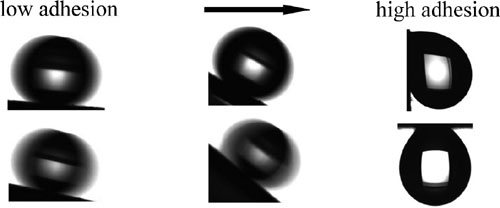
Researchers form the Lanzhou Institute of Chemical Physics have prepared superhydrophobic surfaces with tunable water adhesion that ranges from extremely low to very high by a simple solution-immersion process as well as modification with fluoroalkylsilane. The superhydrophobic surface adhesion could be effectively tuned by the distinct contact modes, which depend on the microstructure configurations on the superhydrophobic surfaces. The present approach could provide a new strategy to prepare superhydrophobic surfaces with tunable water adhesion.
In recent years, superhydrophobic surfaces with a water contact angle (CA) above 150º have attracted considerable interest due to their importance in both fundamental research and practical application. Among these superhydrophobic surfaces, two kinds of extremely superhydrophobic cases exist: low adhesion to water and high adhesion to water. The high-adhesion superhydrophobic surfaces may be important in potential application, such as no loss micro droplet transportation. For most conventional applications, the vast majority of man-made superhydrophobic materials are not particularly useful, as they all show substantial water adhesion. Recently, intense interest has been focused on a new type of superhydrophobic surface with tunable adhesion. However, to the best of the researchers’ knowledge, the fabrication of superhydrophobic surfaces with a wide range of tunable adhesion via the control of surface structure instead of chemical composition is still scarce.
The work has received support from the National Nature Science Foundation of China and National Program on Key Basic Research Project of China (973 Program). The findings have been published in J. Phys. Chem. C (J. Phys. Chem. C 2011, 115, 4726–4729).
J. Phys. Chem. CPaper
